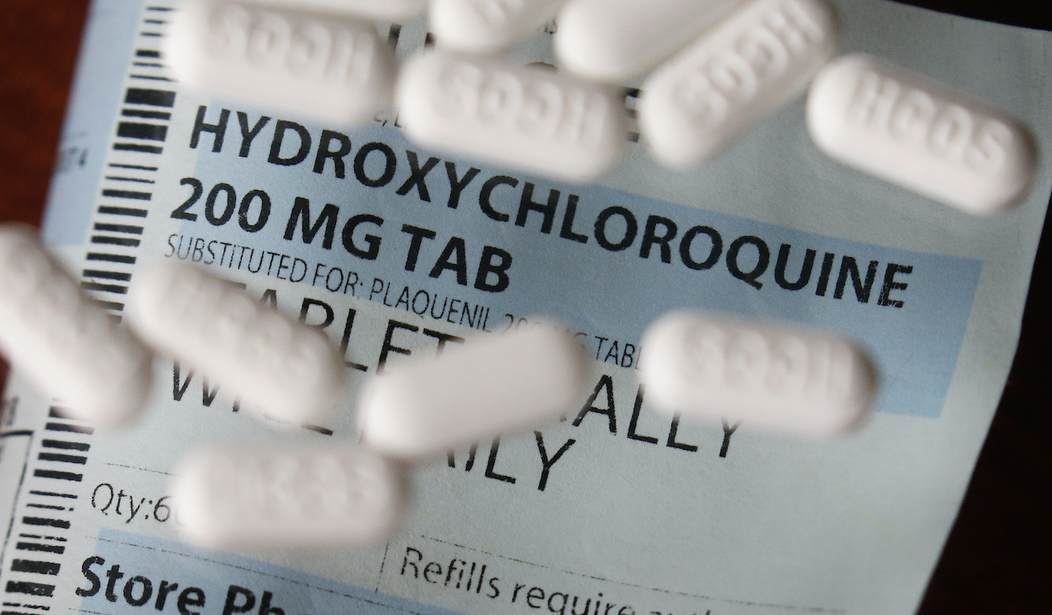On March 19, 2020, during a press briefing, President Trump announced that clinical trials for new therapeutics were already underway. This was promising news. The lockdowns had only recently started and we didn’t know as much about COVID-19 then as we do now.
During that same briefing, Trump specifically mentioned a small French study that found antimalarial drugs chloroquine and hydroxychloroquine showed promise as a potential treatment for COVID-19 and directed the FDA to fast-track clinical trials to approve them as therapeutics.
This was good news, but the media immediately went on attack mode. The president “peddles snake oil and false hope,” wrote the USA Today editorial board. “To fight the coronavirus, President Donald Trump is adopting the audacity of false hope,” claimed CNN.
“Trump was at the White House podium peddling a fake cure for a virus that could kill hundreds of thousands of Americans in a way that would have gotten him kicked off the Home Shopping Network and potentially invited federal prosecution for false claims and fraud,” claimed Salon.
In March, Michigan Gov. Gretchen Whitmer banned the use of hydroxychloroquine or chloroquine to treat coronavirus patients, threatening doctors with “administrative action” if they prescribed it for that purpose. Eventually, she reversed course. Steve Sisolak, the Democrat governor of Nevada, also signed an emergency order restricting the use of chloroquine or hydroxychloroquine to treat the coronavirus.
CNN’s Chris Cuomo also mocked Trump for taking the drug, even though he would go on to take a version of it himself for his own treatment after he tested positive for COVID-19.
The media also falsely claimed an elderly Arizona man died and his wife was put in intensive care after they ingested the drug because Trump had promoted it. It was a flat-out lie. The couple never took the anti-malaria medication at all; they had actually ingested poisonous fish tank cleaner because it contained a chemical variant of chloroquine, chloroquine phosphate, as an additive. But that didn’t stop the media from pretty much accusing Trump of murder. It turned out that the woman was also a rabid anti-Trumper who never would have trusted him to take something that was obviously poisonous.
In May, Dr. John Giles of Columbia University told NPR that fears about hydroxychloroquine made it difficult to recruit volunteers for clinical studies. “Pretty much everybody said, ‘well, that’s the drug that is dangerous to your heart,’ or ‘I talked to friends and they said don’t take it,’ or ‘I saw it on TV that it was dangerous,’” Giles explained. “It became almost impossible to get anyone interested.” Giles eventually gave up on doing his study.
Despite the media attacks, hydroxychloroquine was benefiting many who chose to take it. A Democratic state lawmaker in Ohio said that Trump should be tried for “crimes against humanity” for touting the drug’s potential. The New York Times even alleged that Trump’s motivation for touting it was self-serving because he holds “a small personal financial interest” in Sanofi, even though the drug is out of patent, and he only owned $29 – $435 in the stock as part of a mutual fund.
There have now been over 200 studies into hydroxychloroquine’s effectiveness in treating COVID-19, the overwhelming majority of them showing positive results. Studies on early treatment with the drug showed a 73% improvement in mortality rates.
But the media didn’t want you to know about these studies. Instead, the media largely ignored success stories from COVID patients who recovered after being treated with the drug. The most notable story ignored by the media was that of Democrat State Rep. Karen Whitsett from Detroit, Mich., who not only credited the drug but also President Trump with saving her life.
Instead, the media turned their attention to a few select studies that alleged to show the drug as ineffective and even increased mortality. One such study was the Veterans Affairs study in April, which found a higher mortality rate with patients given the drug. The study was deeply flawed, as the sickest patients were disproportionately administered the drug. The non-peer-reviewed study had no business being reported on. Two other studies followed linking hydroxychloroquine to higher mortality, but those studies were based on faulty data, and two well-respected medical journals had to retract one of them.
As data continued to show that hydroxychloroquine was actually effective in treating COVID-19, doctors who spoke out in support of the drug were censored. The impact of this media assault was catastrophic. One analysis suggests that over 1.6 million lives worldwide have been unnecessarily lost because hydroxychloroquine was not being widely used as a COVID therapeutic.
Had Democrats and the media cared more about saving lives than the presidential election, more people would have been comfortable taking hydroxychloroquine as treatment. More people would have participated in clinical trials. More people would have recovered from the coronavirus. Instead, immediately after Trump started touting the drug, he was criticized and mocked by Democrats, the media, and even government officials. They ignored studies that showed it worked, pretended not to hear anecdotal evidence from patients who were successfully treated by the drug, and told people that hydroxychloroquine could kill them.
_____
Matt Margolis is the author of Airborne: How The Liberal Media Weaponized The Coronavirus Against Donald Trump, and the bestselling book The Worst President in History: The Legacy of Barack Obama. You can follow Matt on Twitter, Gab, Facebook, MeWe, Heroes, Rumble, and CloutHub.










